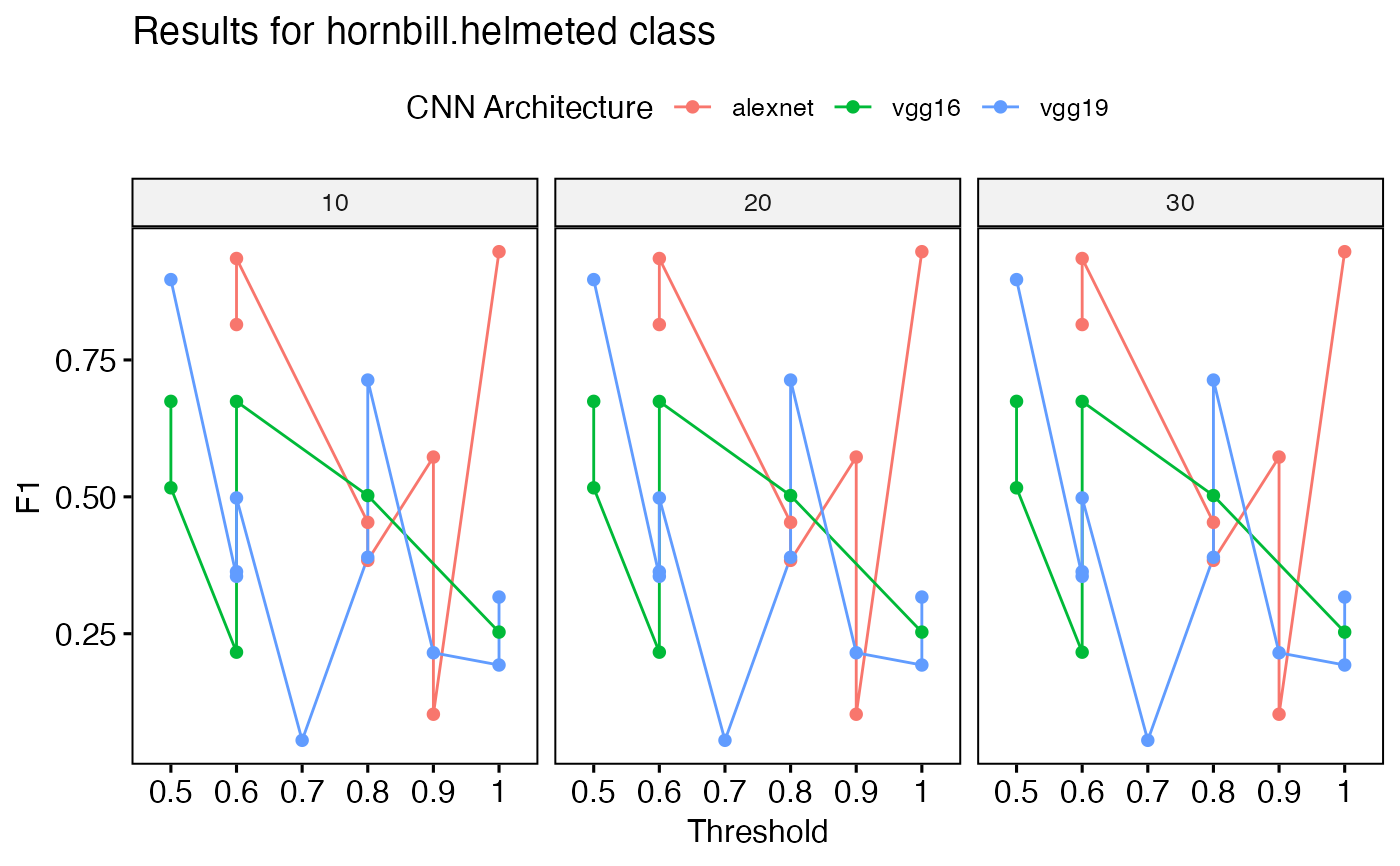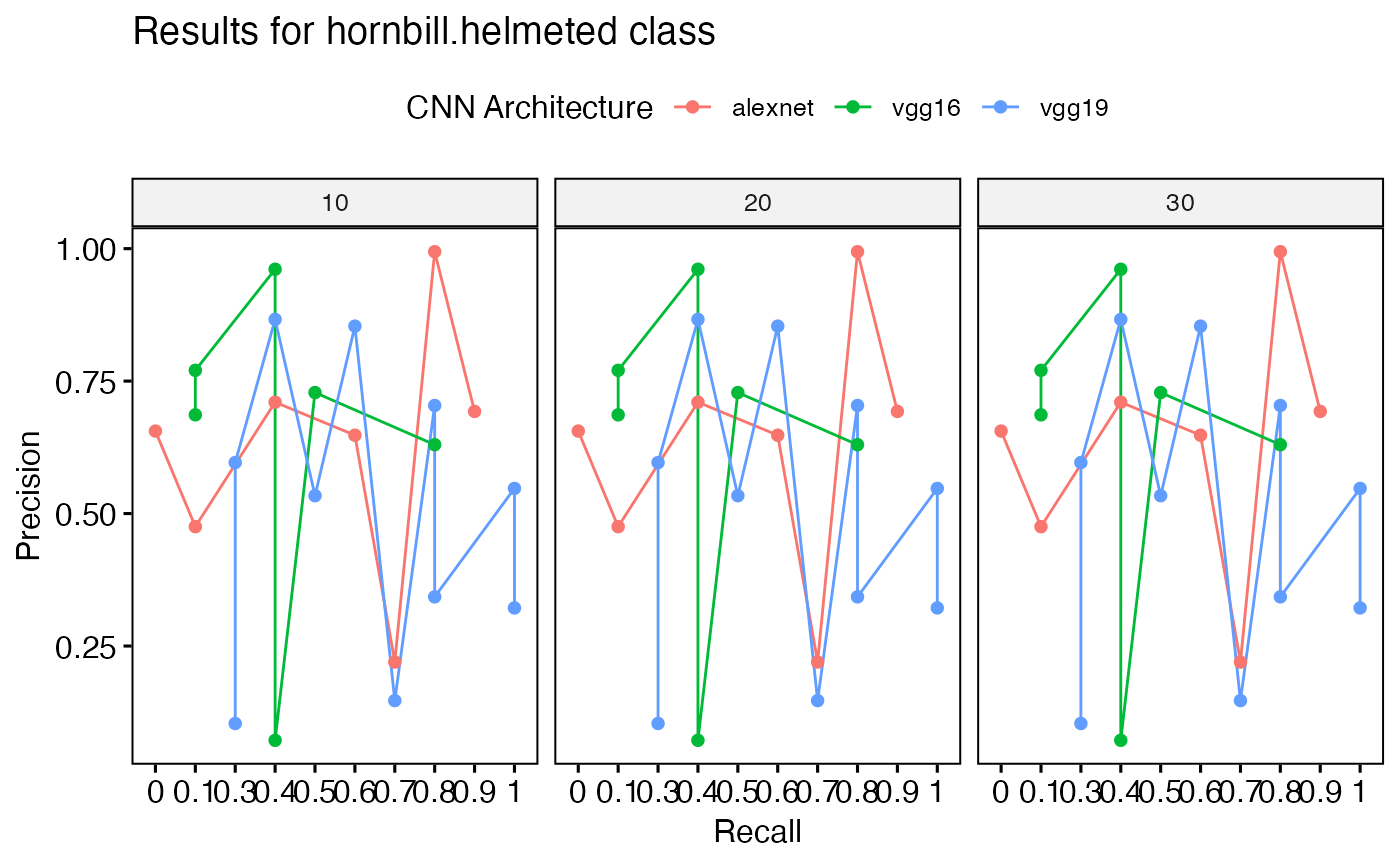Extract Best Performance Results from Performance Tables
Source:R/get_best_performance.R
get_best_performance.RdGiven the path to a directory of performance tables, this function reads in the tables, combines them, and extracts the best performance results based on various criteria.
get_best_performance(
performancetables.dir,
model.type = "multi",
class = "hornbill.helmeted",
Thresh.val = 0.5
)Arguments
- performancetables.dir
Path to the directory containing the performance tables.
- model.type
Type of model architecture. If 'multi' then will treat as multiclass, otherwise will treat as binary.
- class
Specific class for evaluation.
- Thresh.val
Threshold value for evaluation.
Value
A list containing best F1 scores, best precision results, best recall results, and plots visualizing these metrics.
Note
'train_CNN_binary' and 'train_CNN_multi' output a directory of 'performance tables'. This function requres that directory as input.
Examples
{
# Simulate data for performance tables
set.seed(123)
#' Set directory
performance_tables_dir <- paste(tempdir(), "/performance_tables/", sep = "")
#' Create directory for performance tables (NOTE THIS IS FOR TESTING ONLY)
dir.create(performance_tables_dir, showWarnings = FALSE, recursive = TRUE)
#' Define list of model architectures
architectures <- c("alexnet", "vgg16", "vgg19")
#' Define list of training datasets
training_datasets <- c("Dataset1", "Dataset2", "Dataset3")
#' Create performance tables
for (arch in architectures) {
for (td in training_datasets) {
#' Generate random performance metrics
metrics <- data.frame(
Class = rep(c("hornbill.helmeted", "other.class"), each = 5),
"Training Data" = rep(td, 10),
"CNN Architecture" = rep(arch, 10),
Threshold = runif(10, 0, 1),
F1 = runif(10, 0, 1),
Precision = runif(10, 0, 1),
Recall = runif(10, 0, 1),
AUC = runif(10, 0, 1),
`N epochs` = rep(c(10, 20, 30), each = 10)
)
# Reassign column names
colnames(metrics) <- c(
"Class",
"Training Data", "CNN Architecture",
"Threshold", "F1", "Precision",
"Recall", "AUC", "N epochs"
)
#' Write data to CSV file
filename <- paste0(performance_tables_dir, arch, "_", td, ".csv")
write.csv(metrics, filename, row.names = FALSE)
}
}
#' Call the function with default parameters
results <- get_best_performance(performancetables.dir = performance_tables_dir, )
# NOTE: Results will not make sense as it is random
#' message the best F1 scores
message("Best F1 scores:")
print(results$best_f1)
#' message the best precision results
message("Best precision results:")
print(results$best_precision)
#' message the best recall results
message("Best recall results:")
print(results$best_recall)
#' message the best AUC results
message("Best AUC results:")
print(results$best_auc)
#' Plot F1 scores
print(results$f1_plot)
#' Plot precision-recall curve
print(results$pr_plot)
}
#> Evaluating performance for hornbill.helmeted Here are the present classes: hornbill.helmetedEvaluating performance for hornbill.helmeted Here are the present classes: other.class
#> Best F1 scores:
#> # A tibble: 9 × 9
#> Class `Training Data` `CNN Architecture` Threshold F1 Precision Recall
#> <chr> <chr> <chr> <dbl> <dbl> <dbl> <dbl>
#> 1 hornbill.… Dataset1 vgg19 0.779 0.713 0.147 0.738
#> 2 hornbill.… Dataset1 vgg19 0.779 0.713 0.147 0.738
#> 3 hornbill.… Dataset1 vgg19 0.779 0.713 0.147 0.738
#> 4 hornbill.… Dataset2 vgg19 0.515 0.897 0.866 0.373
#> 5 hornbill.… Dataset2 vgg19 0.515 0.897 0.866 0.373
#> 6 hornbill.… Dataset2 vgg19 0.515 0.897 0.866 0.373
#> 7 hornbill.… Dataset3 alexnet 0.954 0.948 0.220 0.737
#> 8 hornbill.… Dataset3 alexnet 0.954 0.948 0.220 0.737
#> 9 hornbill.… Dataset3 alexnet 0.954 0.948 0.220 0.737
#> # ℹ 2 more variables: AUC <dbl>, `N epochs` <dbl>
#> Best precision results:
#> # A tibble: 9 × 9
#> Class `Training Data` `CNN Architecture` Threshold F1 Precision Recall
#> <chr> <chr> <chr> <dbl> <dbl> <dbl> <dbl>
#> 1 hornbill.… Dataset1 alexnet 0.883 0.573 0.994 0.795
#> 2 hornbill.… Dataset1 alexnet 0.883 0.573 0.994 0.795
#> 3 hornbill.… Dataset1 alexnet 0.883 0.573 0.994 0.795
#> 4 hornbill.… Dataset2 vgg16 0.962 0.253 0.961 0.428
#> 5 hornbill.… Dataset2 vgg16 0.962 0.253 0.961 0.428
#> 6 hornbill.… Dataset2 vgg16 0.962 0.253 0.961 0.428
#> 7 hornbill.… Dataset3 vgg16 0.531 0.516 0.770 0.0580
#> 8 hornbill.… Dataset3 vgg16 0.531 0.516 0.770 0.0580
#> 9 hornbill.… Dataset3 vgg16 0.531 0.516 0.770 0.0580
#> # ℹ 2 more variables: AUC <dbl>, `N epochs` <dbl>
#> Best recall results:
#> # A tibble: 0 × 9
#> # ℹ 9 variables: Class <chr>, Training Data <chr>, CNN Architecture <chr>,
#> # Threshold <dbl>, F1 <dbl>, Precision <dbl>, Recall <dbl>, AUC <dbl>,
#> # N epochs <dbl>
#> Best AUC results:
#> # A tibble: 9 × 9
#> Class `Training Data` `CNN Architecture` Threshold F1 Precision Recall
#> <chr> <chr> <chr> <dbl> <dbl> <dbl> <dbl>
#> 1 hornbill.… Dataset1 vgg19 0.779 0.713 0.147 0.738
#> 2 hornbill.… Dataset1 vgg19 0.779 0.713 0.147 0.738
#> 3 hornbill.… Dataset1 vgg19 0.779 0.713 0.147 0.738
#> 4 hornbill.… Dataset2 vgg19 0.515 0.897 0.866 0.373
#> 5 hornbill.… Dataset2 vgg19 0.515 0.897 0.866 0.373
#> 6 hornbill.… Dataset2 vgg19 0.515 0.897 0.866 0.373
#> 7 hornbill.… Dataset3 vgg16 0.531 0.516 0.770 0.0580
#> 8 hornbill.… Dataset3 vgg16 0.531 0.516 0.770 0.0580
#> 9 hornbill.… Dataset3 vgg16 0.531 0.516 0.770 0.0580
#> # ℹ 2 more variables: AUC <dbl>, `N epochs` <dbl>

